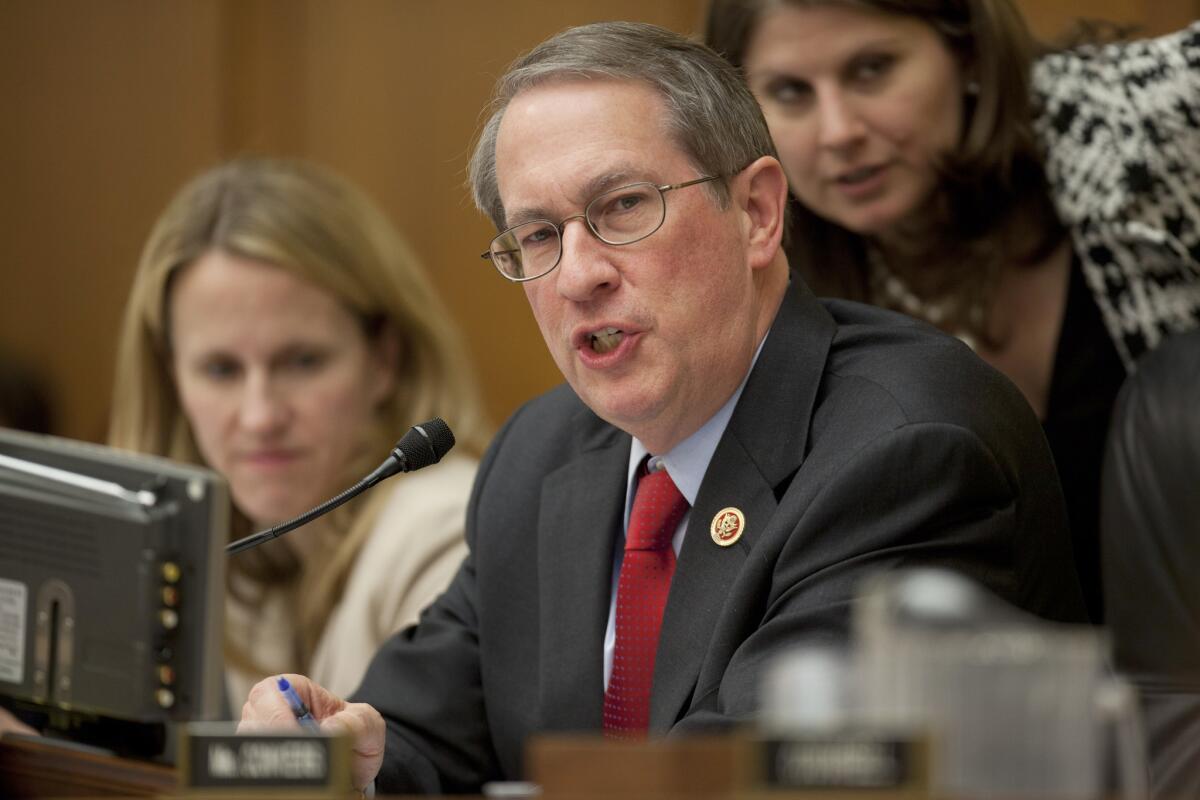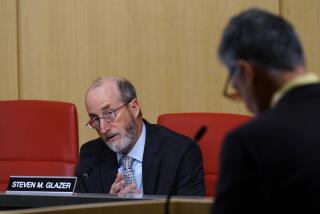Online tax cheats: Being young is no excuse

- Share via
Contrary to what it claimed Thursday, the libertarian advocacy group Generation Opportunity hasn’t killed a Senate-passed bill to compel most online retailers to collect sales taxes. But the group seems to have done its best to mislead and confuse the people it claims to represent.
The so-called Marketplace Fairness Act would let states require online sellers to collect and remit the taxes their residents owe, even if the seller has no physical presence in their states. The measure, sponsored by Sen. Michael B. Enzi (R-Wyo.), would exempt sites with less than $1 million in annual sales. It also would require states to make available free software to calculate the taxes due based on the shopper’s address.
GenOpp focused its grass-roots lobbying fire on the chairman of the House Judiciary Committee, Rep. Bob Goodlatte (R-Va.), urging people Monday to rail against the bill on Goodlatte’s Facebook page. Never mind that Goodlatte had already expressed his dislike for the Senate’s approach; when he criticized the bill in an interview with a local TV station, the station reported, “Goodlatte says it’s unlikely the House of Representatives will pass the Marketplace Fairness Act.”
This led GenOpp to crow that Congress had killed the “Internet tax” in response to the “Facebook bomb” it had triggered on Goodlatte’s site. Goodlatte quickly rebutted that claim, however. “I am open to considering legislation concerning this topic, and the House is working on alternatives to the bill passed by the Senate,” Goodlatte said in a statement to the Washington Examiner.
GenOpp may ultimately be right about the bill’s fate -- only time will tell. But judging by a sampling of the comments on Goodlatte’s Facebook page, its message about the bill is dead wrong.
Here are two representative comments:
“Kill the internet tax,” wrote a Facebook user named Joe Walsh. “[K]eep money in the consumers’ hands, so we can drive the economy.”
“NO INTERNET TAX, be the man who saved this generation of music/cinema lovers, in which some of us can’t afford to download from iTunes or go to the movies,” wrote Samuel Prempeh. “Please be the man who saved the MIDDLE TO LOWER class from this HORRIBLE TAX!”
The measure would not tax the Internet. Nor would it impose a new tax on online sales. Nor would it tax online retailers. The fact of the matter is, in the 45 states that impose sales and use taxes, people who shop online already owe taxes on their Internet purchases.
Let me say that again. If you shop online, you already owe taxes on those purchases. Because of a Supreme Court ruling on mail-order sales that predates the Web, however, the typical online retailer won’t collect sales taxes from shoppers who live in states where it has no offices. Those shoppers are required to pay those taxes when they file their annual income-tax return. Relatively few do, though, and as a consequence, states compensate by collecting more from another source -- for example, by setting a higher sales tax rate on in-state purchases.
To put it simply, the fight here isn’t about who should pay taxes or how much they should pay. It’s about who should collect them.
These points seem lost on Evan Feinberg, the former GOP congressional candidate who leads Generation Opportunity. “My generation sent a loud and clear message to Washington that we will oppose efforts to tax or regulate the Internet,” Feinberg said in a statement. “The Internet tax would have disproportionately harmed my generation, as we do a greater share of our shopping online than older generations.”
In other words, Feinberg thinks members of his generation prefer to be tax evaders than taxpayers. And who wouldn’t, right? But online retailers shouldn’t have an edge over their local competitors just because they make it easy for people to duck the taxman.
Nor should opponents of Enzi’s legislation substitute straw men for the real issues. If they want to exempt online sales from taxation, they should make a case for that. Otherwise, they need to explain why online retailers -- which have no trouble calculating shipping charges based on a shopper’s address -- shouldn’t be required to use similar cloud-based software to collect sales taxes.
ALSO:
Brian D’Arcy, DWP union’s power guy
Colossal mako shark’s death not something to cheer
The assassination of Bobby Kennedy, through the eyes of a college girl
Follow Jon Healey on Twitter @jcahealey
More to Read
A cure for the common opinion
Get thought-provoking perspectives with our weekly newsletter.
You may occasionally receive promotional content from the Los Angeles Times.










